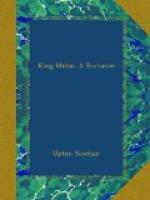“Men have been asking that helpless question since the dawn of time,” he answered, “we only know what we see, this whirling and weaving of shadows, with its sacred facts of beauty and love.”
Helen looked at him thoughtfully a moment, and then, recollecting something she had heard from her father, she said, “But, David, if God be a mystery like that, how can there be any religion?”
“What we may fancy God to be makes no difference,” he answered. “That which we know is always the same, we have always the love and always the beauty. All men’s religion is but the assertion that the source of these sacred things must be infinitely sacred, and that whatever may happen to us, that source can suffer no harm; that we live by a power stronger than ourselves, and that has no need of us.”
Helen was looking at her husband anxiously; then suddenly she asked him, “But tell me then, David; you do not believe in heaven? You do not believe that our souls are immortal?” As he answered her in the negative she gave a slight start, and knitted her brows; and after another pause she demanded, “You do not believe in revealed religion then?”
David could not help smiling, recognizing the voice of his clerical father-in-law; when he answered, however, he was serious again. “Some day, perhaps, dear Helen,” he said, “I will tell you all about what I think as to such things. But very few of the world’s real thinkers believe in revealed religions any more—they have come to see them simply as guesses of humanity at God’s great sacred mystery, and to believe that God’s way of revealing Himself to men is through the forms of life itself. As to the question of immortality that you speak of, I have always felt that death is a sign of the fact that God is infinite and perfect, and that we are but shadows in his sight; that we live by a power that is not our own, and seek for beauty that is not our own, and that each instant of our lives is a free gift which we can only repay by thankfulness and worship.”
He paused for a moment, and the girl, who had still been gazing at him thoughtfully, went on, “Father used to talk about those things to me, David, and he showed me how the life of men is all spent in suffering and struggling, and that therefore faith teaches us—–”
“Yes, dearest,” the other put in, “I know all that you are going to say; I have read these arguments very often, you know. But suppose that I were to tell you that I think suffering and struggling is the very essence of the soul, and that what faith teaches us is that the suffering and struggling are sacred, and not in the least that they are some day to be made as nothing? Dearest, if it is true that the soul makes this life what it is, a life of restless seeking for an infinite, would it not make the same life anywhere else? Do you remember reading with me Emerson’s poem about Uriel, the seraph who sang before God’s throne,—how even that could not please him, and how he left it to plunge into the struggle of things imperfect; and how ever after the rest of the seraphim were afraid of Uriel? Do you think, dearest, that this life of love and labor that you and I live our own selves needs anything else to justify it? The life that I lived all alone was much harder and more full of pain than this, but I never thought that it needed any rewarding.”




